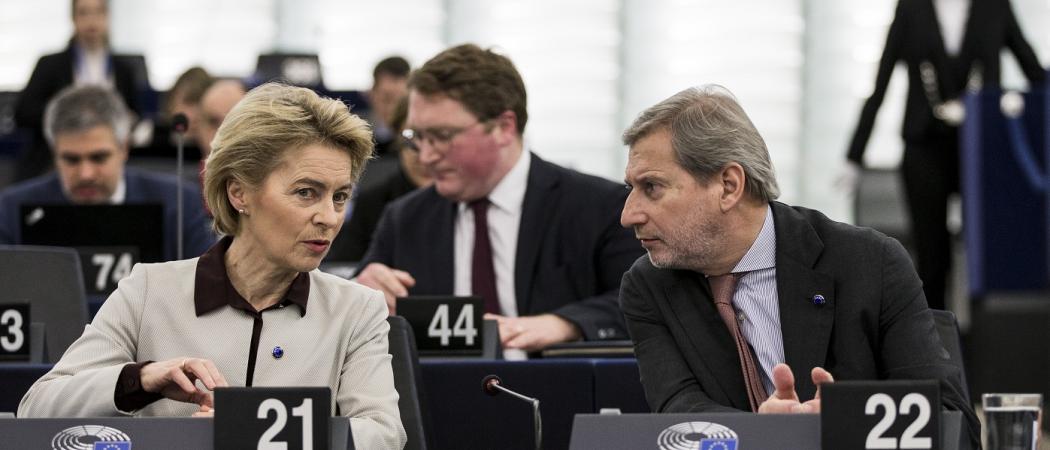European Commission president tells MEPs EU needs a bigger budget if it wants to become a ‘world leading research region’

EU Commission president Ursula von der Leyen and budget commissioner Johannes Hahn in the European Parliament. Photo: European Commission
MEPs want a bigger EU budget for 2021-2027 but can’t agree whether the extra cash should go to research or to protecting traditional programmes such as the common agriculture policy and cohesion.
In a plenary session in Strasbourg on Wednesday, MEPs debated the next multiannual budget of the EU, which is to be agreed on by member states next Thursday.
They worry about the hole in the EU budget after 2021 when the UK is not longer contributing, and urge member states to commit to putting 1.3 per cent of their gross national income (GNI) into the EU coffers, a figure significantly higher than European Commission’s proposed 1.1 per cent.
However, MEPs do not seem to be able to agree on what the EU should do with a bigger budget and are divided over whether the should money be spent on more investment in research and innovation, that contributes to the commission’s ambitious plan for greening the economy, or agriculture subsidies and cohesion funding for less developed regions in the EU.
Greek MEP Dimitrios Papadimoulis of the European United Left said the EU needs member states to spend at least 1.3 per cent of their GNI. At the same time he warned the EU will not be able to roll out its green deal “without severe cuts in cohesion and agriculture.” If these areas do not get a haircut, “there will be no money left for investments and innovation,” said Papadimoulis.
The leader of the European People’s Party (EPP) group in the parliament Manfred Weber said that in the new budget, the EU should “look critically” at how existing funds are spent. An investigation by the New York Times has recently uncovered questionable methods of distributing EU agriculture subsidies to large farm owners with close ties to governments in central and eastern Europe.
The leader of the Renew group Dacian Cioloș agreed the new budget should “modernise” agriculture and cohesion policies and urged MEPs to resist the temptation of pitting “traditional and new policies” against each other. Instead he argued agriculture and cohesion policies should “contribute to our new priorities.”
Papadimoulis said both the parliament and the commission should convince EU prime ministers to reach a favourable agreement, “otherwise the parliament will have to vote a budget which is unacceptable.”
The EU “can’t do more with less [money]”, socialist leader Iratxe García told colleagues in the plenary.
Addressing the plenary, EU commission president Ursula von der Leyen warned MEPs of a backlash from the research community if the final budget deal does match the ambitions she set out for her mandate. “Everybody will turn around to the European Parliament and the European Commission and will ask for Horizon Europe, Erasmus, migration, defence, digitalisation,” she said.
A tough summit ahead
EU leaders are to convene in Brussels next week to debate the size of the budget, but they are likely to pour more cold water on demands from the parliament and the commission for member states to foot the bill for a heftier budget.
They already failed to reach an agreement in November, when net payers to the EU budget would not agree to increase their contribution to the EU budget, while less developed member states wanted to keep cohesion and agriculture budgets untouched.
In the meantime, the UK has finally left the bloc, a move which will poke a hole in the EU budget of about €75 billion over the next seven years.
At the same time, the European Commission has announced new plans to invest in research and innovation needed to transition to a carbon-neutral economy by 2050. It also wants to make the EU a global leader in artificial intelligence.
All this requires more money and von der Leyen told MEPs the new budget should “anchor Europe’s position as world leading research region.”
She urged them to make sure the commission’s new priorities, “get the attention they deserve” in the new budget.
Some member states are “rightly” defending the common agricultural policy and cohesion funds. However, Von der Leyen wants “to see the same dedication when it comes to defending our new priorities.”
In a joint press conference with European Council president Charles Michel, Croatian prime minister Andrej Plenkovic said, "We must do everything to get as much as possible now that a big member state, a net contributor, Great Britain, has left the union."
Michel will chair the budget summit next week and is expected to send EU leaders a draft proposal for the budget by Monday.
Belgian MEP Philippe Lamberts warned EU leaders the parliament will have the final vote over whatever budget deal is reached in the council. He said the parliament will “never accept” a budget lower than the current one. “We won’t give in just because of time pressure,” he said.





 A unique international forum for public research organisations and companies to connect their external engagement with strategic interests around their R&D system.
A unique international forum for public research organisations and companies to connect their external engagement with strategic interests around their R&D system.